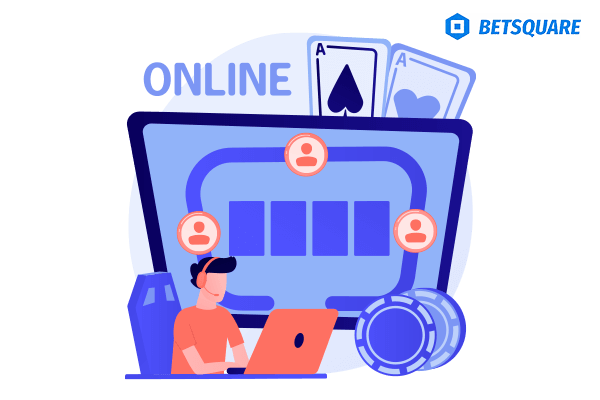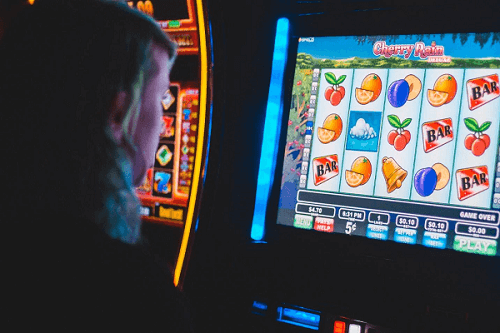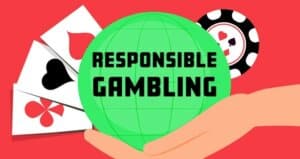Why Is Gambling Addictive?

Gambling is a popular hobby around the globe, including here in Australia. In fact, a study in March 2023 revealed that around three-quarters (73%) of adult Aussies had wagered at least once in the previous 12 months, while as many as 38% gambled weekly.
Data also demonstrates that between 0.5% and 1.0% of the Aussie population are classed as being problem gamblers while at risk of betting compulsively in the future. While the numbers seem small, this equates to a public health issue, which costs between $4.7 billion and $8.4 billion to combat each year.
These individuals are also vulnerable to the numerous psychological and societal harms associated with gambling addiction, from depression and anxiety to financial loss and the breakdown of relationships. But what are the signs and symptoms of gambling addiction, and what steps can you take to protect yourself?
What Is Gambling Addiction?

Like other compulsive behaviours, gambling addiction describes a type of impulse-control disorder that leaves you at the mercy of an overwhelming urge to bet. This persists even when you’re aware that your behaviour can hurt both yourself and those around you, regardless of your financial health or circumstances.
For example, pathological gamblers of this type will continue to wager even when they’re losing huge sums of money. They may also increase their stakes and the amount they are willing to risk in order to recoup losses, even when the odds of winning are against them.
The initial signs of gambling addiction include financial hardship or taking proactive steps to hide your activity from others. From a psychological perspective, you may also find yourself betting when you’re distressed or emotionally dysregulated or becoming increasingly anxious about how to recoup losses.
We’ll touch on what causes gambling addiction in the next section, but it’s important to seek help as soon as you start to recognise the symptoms of compulsive betting. You can then seek initial help from your healthcare provider, who may refer you to a psychologist or counsellor. These individuals are qualified to provide a clinical gambling addiction diagnosis.
Why Is Gambling Addictive?

In terms of how gambling addiction works, this pastime can stimulate the brain’s reward system in the same way as alcohol, drugs, and sex. Dopamine is the dominant driver and chief neurotransmitter within the reward system, and it reinforces sensations of pleasure and instinctively correlates these feelings with a specific action.
In the case of gambling, the mere act of placing bets can activate the reward system, with the combination of risk and the potential of a return incredibly appealing. This, in turn, releases hits of dopamine into the body, reinforcing the feeling of happiness and elation and associating this with the act of gambling.
Of course, winning bets can create ever greater emotional highs, which may encourage you to gamble more in a bid to replicate such feelings. At the same time, other hobbies or activities that you find pleasurable may also start to feel mundane, causing you to spend more time gambling and increase the amount of money that you wager.
While these are the mechanisms of gambling addiction, the condition may change and evolve over time. For example, gambling may stop being entertainment or a pleasurable hobby and instead become something that you believe can solve your issues. This is especially true if you incur significant financial losses through your addiction, as gambling may seem like the only logical way to reverse this situation.
Over time, gambling may also become a coping mechanism, which enables you to manage your anxiety or stress. This is even though betting may have caused these symptoms in the first place. This further highlights the complex psychology of gambling addiction and how your compulsion can evolve over time.
Gambling Addiction Symptoms
We’ve already touched on some of the symptoms of gambling addiction, which may be physical, psychological, and even behavioural in some instances. In fact, compulsive gambling is the only behavioural addiction that the DSM-5 in North America recognises, while the World Health Organisation (WHO) takes a similar view.
Each type of symptom will have its own unique impact on an afflicted individual and precisely how they feel. They may also present in different ways, and it’s important to understand this when identifying signs of gambling addiction in either yourself, a spouse, or a loved one:
| Physical Symptoms | Psychological Symptoms | Behavioural Symptoms |
| Headaches | Anxiety / Stress | Secrecy |
| Nausea | Depression | Borrowing Money |
| Diarrhoea | Feeling Restless or Irritable | Increased Gambling Activity |
| Lack of Appetite / Weight Loss | Guilt | Aggressively Trying to Recover Losses |
| Lack of Sleep | Helplessness | Selfishness |
Risk Factors for Developing a Gambling Addiction

Rates of gambling participation are highest among people who are employed, financially comfortable and equipped with higher education credentials. However, the socio-demographic profile of at-risk or problem gamblers is completely different, as a number of telling risk factors come into play. These include:
- Location and Employment Status: Problem gamblers are more likely to live in deprived areas, which typically feature a higher concentration of bookies and betting shops. They’re also statistically more likely to be unemployed and may start gambling as a way of boosting their income.
- Age: According to data gathered by the Australian Institute of Family Studies, younger gamblers are most at risk of becoming problem gamblers. In fact, young adults aged between 18 and 34 are more than twice as likely to be at risk of harm when compared to bettors aged 55 and over.
- Gender: Men are more than twice as likely to be problem gamblers than women, even though both genders have relatively similar participation rates. However, this may be accounted for by the fact that men (48%) gamble twice as much as women (28%) on a regular basis, increasing their exposure to risk and problematic behaviour.
- Character Traits: People who are impulsive or restless by nature are also more likely to become problem or at-risk gamblers. Similarly, highly competitive individuals may enjoy an even greater psychological rush by gambling frequently, while people with a significant work ethic may also turn to betting as a way of managing their stress.
- Existing Mental Health Issues: If you suffer from existing mental health issues, such as anxiety, depression, or personality disorders, you’re also at risk of becoming a compulsive gambler. Similarly, people with existing addictions or substance abuse problems may be more prone to developing a gambling addiction over time.
The Dangers of Gambling Addiction
The impacts of problem betting are commonly referred to as ‘gambling-related harms’, while they can be personal and societal in nature. Of course, it’s personal harms that are most devastating from an individual perspective, but what is the real impact of gambling addiction, and how can it affect your life over time?
Early Signs of Gambling-Related Harm
- Reduced Disposable Income: As you start to wager more frequently and increase your stake amounts, you may find you have less disposable income for recreational activities, holidays, and going out with loved ones. This, coupled with an inability to save, could impact your quality of life in the short term.
- Increased Alcohol Consumption: By venturing out less and becoming consumed by gambling, you may find yourself increasingly isolated from those around you. This can encourage other antisocial or unhealthy behaviours, such as increased alcohol consumption, reduced sleep, and poor dietary choices.
- Feelings of Guilt, Shame, and Depression: These behaviours can create a cycle of poor mental health, which persists and worsens as you continue to gamble more. This may also contribute to conditions such as anxiety or depression, which may be further exacerbated by feelings of guilt and shame relating to your behaviour.
More Advanced Signs of Gambling-Related Harm
- More Serious Financial Difficulties: The compulsive nature of problem gambling means that it will worsen unless it’s addressed, so you’ll typically gamble increased amounts over time (regardless of how frequently you win or your financial circumstances). This may create more serious financial difficulties, including mounting debts and the failure to pay important household bills.
- Relationship and Work Conflicts: As you become more preoccupied with gambling and isolated from those around you, your personal and professional relationships could become fractured. So, you may become estranged from your spouse, partner, or children (especially if you’re hiding things from them) while struggling to maintain an acceptable level of performance at work.
- Increased Emotional Problems: Over time, you may become increasingly reliant on gambling to manage stress and your emotional dysregulation (it may even become your only source of income if you lose your job). However, this is more likely to increase your emotional issues, creating deeper depression, anger, and even feelings of hopelessness.
In this title, the scatter symbol is a stone block embossed with the word BONUS, a fitting symbol for an underground mining adventure. The Money Cart Bonus is triggered and played out in a different arena when three blocks land on the game grid. The multiplier scatter sticks in position for the duration of the feature, multiplying your wins on every spin for a seriously supercharged prize pot!
How to Stop Your Gambling Addiction
Of course, you may have already begun to notice the symptoms of gambling addiction or struggled with compulsive betting problems throughout your life. Regardless, there are ways in which you can stop problem gambling and hopefully learn to manage your activity over time. Here are some tips and strategies to keep in mind:
Seek Out Professional Help
As soon as you’re able to recognise symptoms, your first port of call should be to seek out professional help. This may mean speaking to your primary healthcare professional and earning a referral to an addiction specialist or calling on a counsellor whom you know and have spoken to before. The key is that you reach out as soon as you possibly can while recommending this option to someone who is struggling is one of the best ways to help someone with a gambling addiction.
Ongoing Therapy
To help cope with your compulsion, you may also decide to engage in regular therapy sessions. These can take the form of frequent one-on-one sessions with a trusted and licensed counsellor or group therapy meetings where you talk and build bonds with other addicts. Consistency is key here, especially as it creates a constant channel through which to talk through your problems and minimise the urge to bet.
Consider Self-Exclusion
If you’re wondering how to overcome a gambling addiction, you may also want to consider practical steps that put distance between you and your preferred games or betting markets. If you wager online, self-exclusion may be a viable option. Most regulated markets now require operators to offer self-exclusion to customers (including Australia), and this enables you to remain logged out of your accounts for an agreed period of time. You’ll also be prohibited from receiving promotions and bonus offers during this time.
Tips on How to Reduce the Risk of Gambling Addiction
For those of you who currently wager responsibly and within your means, you won’t need to follow such drastic steps. However, it is worth being proactive and reducing the risk of your becoming addicted to gambling in the future so that you can enjoy what’s supposed to be a fun and entertaining pastime with genuine peace of mind. Here are some tips to remember:
- Manage Your Bankroll Carefully: Disciplined bankroll management is key to avoiding a gambling addiction. Your bankroll should never exceed an amount that you can comfortably afford to lose, for example, while this should be set per day, week, or month, depending on your betting patterns. You must always adhere to this while carefully regulating individual stake amounts based on factors such as odds, implied probability and potential returns.
- Make Use of Responsible Gambling Tools: Regulators also compel licensed betting sites to offer responsible gambling tools to their customers. These can help you manage your activity, and they include customisable deposit limits and activity trackers. The former enables you to manage your bankroll and cap the amount you can deposit each day, week, or month, while the latter lets you monitor your betting behaviour and identify any sudden or extended peaks.
- Choose Your Payment Methods Wisely: In Australia and the UK, gambling with a credit card has been banned. This is to prevent you from wagering with borrowed funds, and it’s always worth being selective when choosing a preferred payment method online. Ideally, you should bet using your Visa debit card or a bank transfer, as this makes it easier to monitor and manage your spending. Or, use the Paysafecard, which is a prepaid option that cannot be reloaded and boasts relatively low limits.
Gambling Addiction - Final Thoughts
While only a small percentage of the Aussie adult population is classed as problem gamblers, this issue can devastate lives and drive huge public health costs every single year. Much of the psychology behind problem gambling is also innate, while there are several risk factors that may cause or exacerbate gambling-related harm both personally and societally.
Fortunately, there are steps that you can take to minimise the risk of becoming a problem gambler. Even if you’ve demonstrated compulsive betting behaviour before and continue to struggle, you can always seek out professional help and use tools like self-exclusion to assume greater agency going forward.
We’d also encourage you to learn more about this topic by reading some of the related articles that are available on our blog. This may help you to spot the signs of gambling addiction, either in yourself or a loved one.
FAQ
What is Problem Gambling?
Problem gambling describes a type of compulsive betting behaviour that makes it impossible to resist the urge to bet. This may be despite the harm you know you’re causing to yourself and your loved ones, or even in instances where you continue to lose huge sums of money and absorb mounting debts.
How Can a Gambling Addiction Impact Your Relationships?
A gambling addiction can impact your relationships in a number of ways, whether you withdraw from your loved ones, lie and attempt to cover up your behaviour or create significant financial damage. In addition to harming personal relationships, it may also affect your work performance and could even cost you your job.
What’s the Psychology Behind Gambling Addiction?
This has to do with the reward system in the human brain, which is driven by dopamine. This neurotransmitter reinforces sensations of pleasure while associating this with a particular action or pastime (such as gambling). So, the act of gambling and winning money releases ever greater dopamine hits into your body, causing you to become increasingly dependent and seek increasingly bigger payouts over time.




